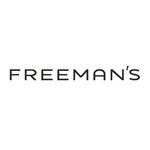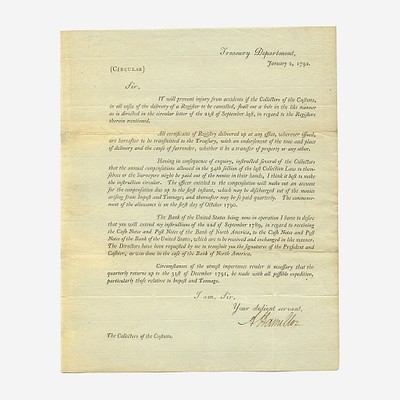[Hamilton, Alexander] [Reynolds Pamphlet] Observations on Certain Documents Contained in No. V & VI of �The History of the United States for the Year
About Seller
2400 Market St
Philadelphia, PA 19147
United States
Established in 1805, Freeman’s Auction House holds tradition close, with a progressive mind-set towards marketing and promotion, along with access to a team of top experts in the auction business. And now with offices in New England, the Southeast, and on the West Coast, it has never been easier to ...Read more
Two ways to bid:
- Leave a max absentee bid and the platform will bid on your behalf up to your maximum bid during the live auction.
- Bid live during the auction and your bids will be submitted real-time to the auctioneer.
Bid Increments
| Price | Bid Increment |
|---|---|
| $0 | $25 |
| $500 | $50 |
| $1,000 | $100 |
| $2,000 | $200 |
| $3,000 | $250 |
| $5,000 | $500 |
| $10,000 | $1,000 |
| $20,000 | $2,000 |
| $30,000 | $2,500 |
| $50,000 | $5,000 |
| $100,000 | $10,000 |
About Auction
Oct 25, 2021
Freeman's is honored to present The Alexander Hamilton Collection of John E. Herzog, a single-owner sale of Alexander Hamilton material, on October 25. Curated by Darren Winston, Head of the Books and Manuscripts Department. Freeman's info@freemansauction.com
- Lot Description
[Hamilton, Alexander] [Reynolds Pamphlet] Observations on Certain Documents Contained in No. V & VI of �The History of the United States for the Year 1796,�...
Rare first edition of the infamous �Reynolds� pamphlet that revealed Alexander Hamilton's affair and subsequent blackmail
"The charge against me is a connection with one James Reynolds for purposes of improper pecuniary speculation. My real crime is an amorous connection with his wife, for a considerable time with his privity and connivance, if not originally brought on by a combination between the husband and wife with the design to extort money from me."
Philadelphia: Printed for John Fenno, by John Bioren, 1797. First edition. 8vo. 37, (1), lviii pp. Three-quarter red morocco over red linen-covered boards, stamped in gilt, joints and corners rubbed; old ownership inscriptions of Robert Means, Jr., and Sr., on title-page and p. (3); scattered soiling to title-page, top corner of same repaired, verso gutter of same reinforced; scattered light spotting to text; final leaf repaired along fore-edge; book-plate of (Alfred E.) Hamill on front paste-down. Evans 37571; Howes H-120; Sabin 29970 (The three citations listed here do not mention any textual variations but after collating this copy against two other copies of the same edition, as well as the 1800 reprint, multiple very minor textual differences were found between all four copies. Priority between the three 1797 copies is as yet undertermined).
First edition of the infamous "Reynolds Pamphlet", published and written by Alexander Hamilton, outlining his affair with Maria Reynolds, and subsequent extortion by her and her husband, James Reynolds. Considered one of the first major sex scandals in the history of the United States. The Hamilton family went to great lengths to acquire and destroy all copies of this first edition.
In the summer of 1791, when Hamilton was nearing the height of his political powers, a young woman, Maria Reynolds, appeared at his doorstep with a tale of abuse and abandonment at the hands of her husband, James Reynolds. Seeking his financial assistance, Hamilton informed her that he would visit her at her home later that night with some money. When he arrived he made what Ron Chernow observes as "one of history's most mystifying cases of bad judgment, he entered into a sordid affair with a married woman...that, if it did not blacken his name forever, certainly sullied it." The affair continued through the summer and into the fall, when James Reynolds reappeared. Though he appeared angry and upset at the news of their affair, he also sought financial compensation. For the next ten months Hamilton would continue his affair with Maria while also paying James blackmail money under the threat of him exposing the tryst to Hamilton's wife and his political enemies. By November 1792 the affair had ended, when Reynolds, along with Jacob Clingman, were arrested for defrauding the government. In order to secure their own release, they spoke to officials of having proof of professional misconduct committed by Hamilton. The "proof" turned out to be the payments Hamilton made to Reynolds, but in their telling, not for the purposes of blackmail, but instead to secretly peddle in financial speculation. When informed of the payments, Speaker of the House Frederick Muhlenberg, Representative Abraham Venable, and Senator James Monroe confronted Hamilton about the charges. They would be the first to hear Hamilton's own confession about the affair and subsequent blackmail. Satisfied with Hamilton's account, they swore to keep the knowledge of the affair secret, but gossip circulated in small circles in the ensuing years. In June 1797, Scottish �migr� and writer James Callender published articles accusing Hamilton of corruption and he also exposed rumors of the affair, possibly through information obtained from Monroe. Hamilton, always quick to defend his name no matter the risk, was left with the choice of staying silent or defending himself, which would entail admitting to the affair and blackmail payments. Against the advice of his friends and closest confidants, Hamilton published the above pamphlet in order to clear his name, but in doing so committed the biggest political blunder of his career. The pamphlet proved to be political fodder for his enemies for years to come, and while it did not destroy his political career, it did limit the scope of his professional possibilities in future. In 1800 his enemies would reprint the pamphlet to keep the scandal alive and prevent anyone from nominating Hamilton for the presidency.
- Shipping Info
-
No lot may be removed from Freeman’s premises until the buyer has paid in full the purchase price therefor including Buyer’s Premium or has satisfied such terms that Freeman’s, in its sole discretion, shall require. Subject to the foregoing, all Property shall be paid for and removed by the buyer at his/ her expense within ten (10) days of sale and, if not so removed, may be sold by Freeman’s, or sent by Freeman’s to a third-party storage facility, at the sole risk and charge of the buyer(s), and Freeman’s may prohibit the buyer from participating, directly or indirectly, as a bidder or buyer in any future sale or sales. In addition to other remedies available to Freeman’s by law, Freeman’s reserves the right to impose a late charge of 1.5% per month of the total purchase price on any balance remaining ten (10) days after the day of sale. If Property is not removed by the buyer within ten (10) days, a handling charge of 2% of the total purchase price per month from the tenth day after the sale until removal by the buyer shall be payable to Freeman’s by the buyer. Freeman’s will not be responsible for any loss, damage, theft, or otherwise responsible for any goods left in Freeman’s possession after ten (10) days. If the foregoing conditions or any applicable provisions of law are not complied with, in addition to other remedies available to Freeman’s and the Consignor (including without limitation the right to hold the buyer(s) liable for the bid price) Freeman’s, at its option, may either cancel the sale, retaining as liquidated damages all payments made by the buyer(s), or resell the property. In such event, the buyer(s) shall remain liable for any deficiency in the original purchase price and will also be responsible for all costs, including warehousing, the expense of the ultimate sale, and Freeman’s commission at its regular rates together with all related and incidental charges, including legal fees. Payment is a precondition to removal. Payment shall be by cash, certified check or similar bank draft, or any other method approved by Freeman’s. Checks will not be deemed to constitute payment until cleared. Any exceptions must be made upon Freeman’s written approval of credit prior to sale. In addition, a defaulting buyer will be deemed to have granted and assigned to Freeman’s, a continuing security interest of first priority in any property or money of, or owing to such buyer in Freeman’ possession, and Freeman’s may retain and apply such property or money as collateral security for the obligations due to Freeman’s. Freeman’s shall have all of the rights accorded a secured party under the Pennsylvania Uniform Commercial Code.
-
- Buyer's Premium



 EUR
EUR CAD
CAD AUD
AUD GBP
GBP MXN
MXN HKD
HKD CNY
CNY MYR
MYR SEK
SEK SGD
SGD CHF
CHF THB
THB![[Hamilton, Alexander] [Reynolds Pamphlet] Observations on Certain Documents Contained in No. V & VI of �The History of the United States for the Year](https://s1.img.bidsquare.com/item/l/9470/9470987.jpeg?t=1MwoEU)
![[Hamilton, Alexander] [Reynolds Pamphlet] Observations on Certain Documents Contained in No. V & VI of �The History of the United States for the Year](https://s1.img.bidsquare.com/item/s/9470/9470987.jpeg?t=1MwoEU)











